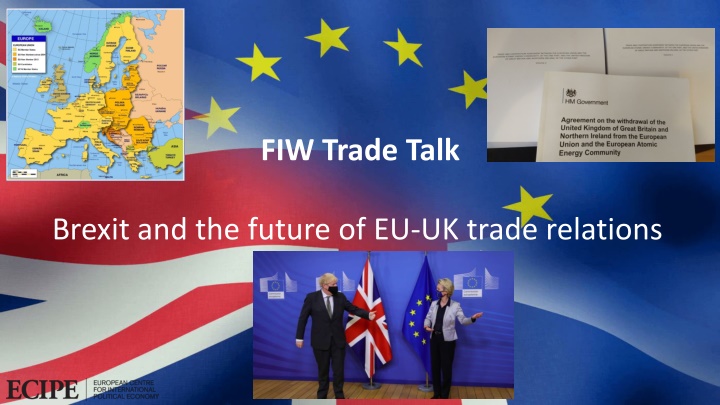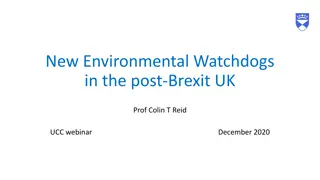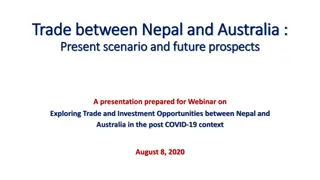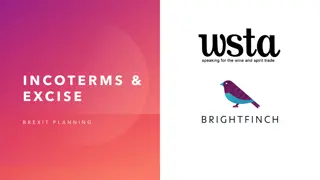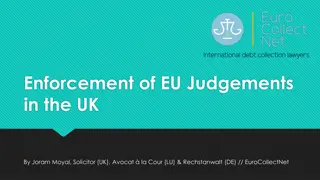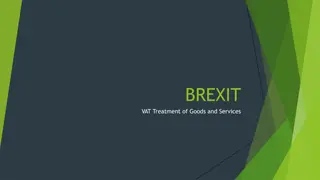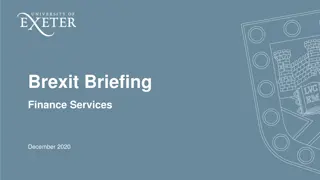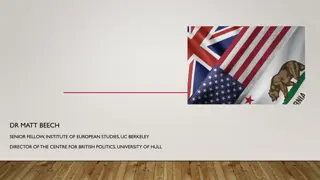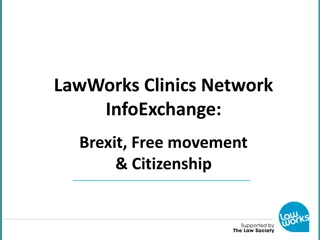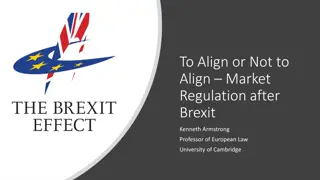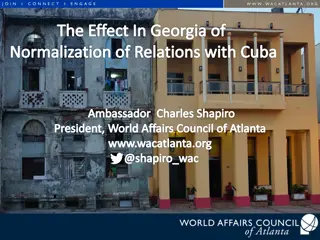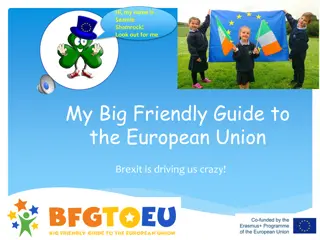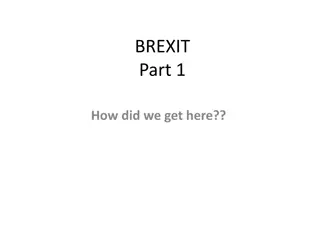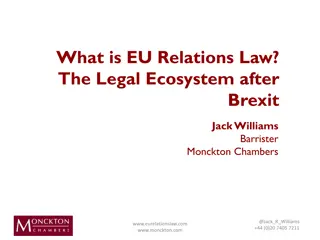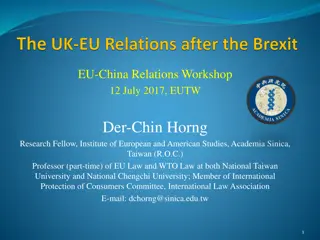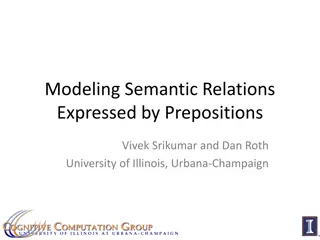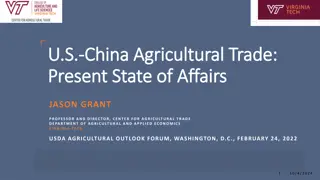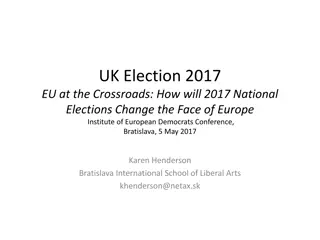Brexit and the Future of EU-UK Trade Relations
Trade relationships between the European Union and the United Kingdom post-Brexit are explored, covering agreements, modern trade dynamics, and implications for both parties. The discussion includes the nature of contemporary trade relations, UK-EU trade agreements, regulatory cooperation, and potential future scenarios for trade policies and economic adjustments. Insights on global value chains, regional supply chains, and the complexities of trade regulations in modern commerce are also highlighted.
Download Presentation

Please find below an Image/Link to download the presentation.
The content on the website is provided AS IS for your information and personal use only. It may not be sold, licensed, or shared on other websites without obtaining consent from the author.If you encounter any issues during the download, it is possible that the publisher has removed the file from their server.
You are allowed to download the files provided on this website for personal or commercial use, subject to the condition that they are used lawfully. All files are the property of their respective owners.
The content on the website is provided AS IS for your information and personal use only. It may not be sold, licensed, or shared on other websites without obtaining consent from the author.
E N D
Presentation Transcript
FIW Trade Talk Brexit and the future of EU-UK trade relations
Four slides About Me Nature of modern trade relations Director, UK Trade Policy Project, European Centre for International Political Economy UK-EU trade agreements and modern trade relations Current research interests future UK trade policy, the new global trade, regulations and trade, new issues in trade such as climate change, animal welfare, and consumers Possible next steps and UK economic adjustment Bigger trade picture in the context of UK-EU relations Between 2009 and 2018 worked for UK government on TTIP, establishment of trade department after Brexit, US-China relations, better regulation Writes on international trade including new weekly column for Borderlex 2
Modern Trade Relationships Trade has grown, goods in particular from 1990 2008, services steadily since early 2000s Global Value Chains account for anywhere between 50 and 80% of trade according to calculation Three main regional supply chains, North America, Europe, East and Southeast Asia, dominate global trade The web of relationships between major producers (in goods and services) and their suppliers is increasingly complex and poorly understood Virtually all trade is in some way regulated, products and services subject to regulation, plus general societal regulations UK Trade 1999 - 2019 800000 700000 600000 500000 400000 300000 200000 100000 0 1999 2000 2001 2002 2003 2004 2005 2006 2007 2008 2009 2010 2011 2012 2013 2014 2015 2016 2017 2018 2019 Exports: EU28 Exports (RoW) Total Exports Imports: EU28 Imports (RoW) Total Imports 3
UK-EU Agreements (Withdrawal Agreement, Trade and Cooperation Agreement) Different Agreements Goods General regulatory cooperation Withdrawal Agreement covers Northern Ireland EU / GB relations, plus geographical indications Trade and Cooperation Agreement covers trade plus related areas included transport, energy Separate future agreements are possible e.g. mutual recognition No tariffs subject to rules of origin Only bilateral cumulation bad for complex supply chains Limited easing of regulatory checks full food and drink checks, minor easing of checks in industrial areas UK withdrawal from European regulatory agencies Regulatory cooperation elements of TCA limited, new agreement on financial services due by March Data and financial services equivalence incentive for UK not to diverge to gain this Services Rules European neighbourhood UK does not join PEM rules of origin Limitations of UK-EU TCA also limits scope of UK agreements with Norway, Switzerland, Turkey Considerable barriers to services trade compared to single market No mutual recognition of professional qualification No long term data equivalence Barriers to movement of people The strictest rules ever seen in a trade agreement on labour and the environment enforceable non- regression and divergence clauses Potential penalties for future denial of access to UK fishing waters 4
Possible Next Steps and UK Economic Adjustment Economic Adjustment Politics UK Trade 2016 - 2019 Politics of Northern Ireland and Scotland Business pressure on UK government not to diverge versus Brexiteer pressure for Brexit dividend Labour Party not currently proposing closer relationship no significant change for some years Economic and human cost of barriers Possible trade deals with US and CPTPP taking UK further away from EU rule-set 300000 250000 200000 150000 100000 50000 0 EU Goods Exports EU Goods Imports RoW Goods Exports RoW Goods Imports EU EU RoW Services Exports RoW Services Imports Services Exports Services Imports 2016 2017 2018 2019 UK-EU goods trade already flat since referendum Does it decline? Does services trade follow? Impact on Rest of the World trade? For example if UK no longer significantly part of European supply chain for goods Services figures may be exaggerated by US trade? Covid effect Likeliest outcome trade flat or falling for a period 5
What does the UK-EU deal mean for the wider trade context? European supply chains are weakened with EU-UK barriers. For example fragmentation of the services market in the EU away from London is likely to lead to an overall loss of competitiveness. EU-US relations are risked by a UK-US agreement which takes the US position on long running disputes include agriculture and technical standards. Climate change and labour provisions may become a precedent for other agreements, which may cause issues with agreement, or for Mercosur signed but not yet ratified, in this passing through Parliament. If UK, EU and US could work together on future climate change measures there may be a more positive precedent. Question of future regulatory alignment likely to affect future discussions starting with data and financial services, then moving onto other areas including veterinary equivalence, professional qualifications, mutual recognition of professional qualifications. How do both sides address this? To what extent will either side wish to use enforcement measures? UK as competition for the EU, to what extent does this incentivise both sides to innovate further? This could potentially be a positive effect. Ability of UK and EU to work together at the WTO still to be tested, important for resolving issues there. 6
